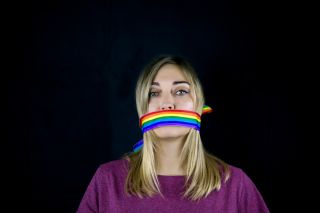Sex
Silence of the Trans
It’s time to debunk the myth that the LGBTQ community is harmful to children.
Updated September 12, 2023 Reviewed by Michelle Quirk
Key points
- Conflating sexual abuse with homosexuality is absurd.
- Exposing a child to gender-expression diversity may help explain their feelings and ease their unhappiness.
- This idea that an LGBTQ person is only a sexual being who can’t control their sexual urges is utter nonsense.
The pitchforks are out for LGBTQ members of our society. As of this writing, a tsunami of nearly 400 bills attacking various aspects of LGBTQ life has recently been introduced in Republican-led legislatures around the nation. These include banning drag shows, banning and/or criminalizing gender-affirming care, banning drag queen storytime at libraries and bookstores, banning transgender youths from participating in sports, and even banning books that mention homosexuality. Transgender people are becoming even more demonized than they have been in the past, with some politicians calling for “transgenderism” to be wiped off the face of the earth.

How does one do that without wiping out transgender people themselves? And what does Kid Rock shooting up cans of Bud Light because the company featured a partnership with Dylan Mulvaney, a popular transgender TikTok influencer imply? Isn’t it an obvious metaphor, just one step removed from condoning shooting an actual transgender person? This is a dangerous direction.
Of course, much of the impetus for these seemingly sudden attacks can be attributed to politics. Anti-LGBTQ politicians and groups have discovered that these issues stoke reaction and take the focus off of their political agendas and provide them with media attention and a fundraising bonanza. However, as a psychotherapist, I am more interested in people’s underlying fears that make this sort of “othering” possible on such a large scale. One answer lies, I believe, in the false belief that LGBTQ people—especially drag queens, trans women, bisexuals, and gay men—are oversexed and unable to control their sexual impulses, especially around children.
Conflating Sexual Abuse With Homosexuality Is Absurd
In other words, it is a common myth to believe “gay” means prone to sexually abuse. When people learn that priests and Scout leaders have been preying on male children, they think “gay.” When they think of trans women, they think “gay men in drag” or “oversexed men or boys wanting access to women’s restrooms for sexual purposes.” Conflating homosexuality with sexual abuse is simply wrong.
Homosexuality and Transgenderism Are Not a "Choice"
The other underlying myth is that homosexuality is a choice, an ideology that if someone is exposed to can “turn them gay or trans.” As a sex and relationship counselor for almost 40 years, I can tell you that this is absurdly false. We are what we are. No one “turns us” into something we aren’t already.
This same fear is behind the idea that if a child is exposed to a drag queen or a transgender person, they somehow will be influenced to become the same. Truthfully, we have little to no control over who we become in our lives. A child who suffers from gender dysphoria cannot simply shut off these feelings. Nor can they pretend to feel otherwise without serious mental health problems. A study published in the journal Pediatrics noted that more than half of transgender male teens (that is, someone whose gender identity or expression doesn’t correspond with the sex they were assigned at birth) have attempted suicide. The national statistic for trans suicide is 41 percent in the United States.
So, the irony here is that anti-trans activists emphasize parental control and child protection while seeking to prevent or even prosecute parents who are trying to help their child transition through gender-affirming care, vastly increasing the chance that the child may attempt suicide. As Saturday Night Live star Molly Kearney said while talking about trans kids' rights, "When people hear the term, 'trans kids' it seems that don’t hear the word 'kids' and focus only on their being trans." Wiping one out wipes them both out.
In my view, by exposing a child to the idea that there is diversity in gender expression, which there is, they are provided with a new template that may help explain their feelings and ease their unhappiness. This is not “indoctrination.” Rather, it is recognizing that diversity, inclusion, and empathy are worthy values. On the other hand, banning or criminalizing actions that may help a child come to terms with their gender dysphoria is obviously not being done in the child’s interest, but rather either calming one’s own fears about a child’s sexual safety or stoking fears in order to accumulate votes or money from fundraising.
One can see how these myths affect aspects of life in America, as well. For instance, very often when one partner in a heterosexual marriage comes out as gay, their straight partner, who is understandably hurt and angry, sometimes makes up sexual issues involving the children with the judge presiding over their divorce—maybe one lie that the gay partner exposed himself to the child, or another lie that the lesbian partner engaged in sex with her lover while the kids walked by the room. A judge who leans toward homophobia will believe the straight spouse and subsequently allow only supervised visits from the gay or lesbian partner. Homophobia is used as a weapon through sexual attacks toward those who are LGBTQ and often wins.
As for a person identifying as transgender using their bathroom of choice, straight people project their own imagined sexual feelings onto them—what they would feel by going into a bathroom made for the opposite sex. LGBTQ persons use the bathroom in the same way straight people do—to do our business and leave! The idea is that LGBTQ people can’t control themselves, which is false and offensive.
This idea that an LGBTQ person is only a sexual being who can’t control their sexual urges is utter nonsense. In the comments for a TikTok video I created about drag queens' story time, one person said, “I don’t want a drag queen gyrating in front of my kids!” Does this person really think that a drag queen doesn’t know the difference between reading for drag queen storytime and performing in a bar for adults?
We owe it to our children and others who don’t fit into the heterosexual and cisgender expectations of our society to be seen for who they are, not the projections of the heteronormative, cisgender, patriarchal norm.




